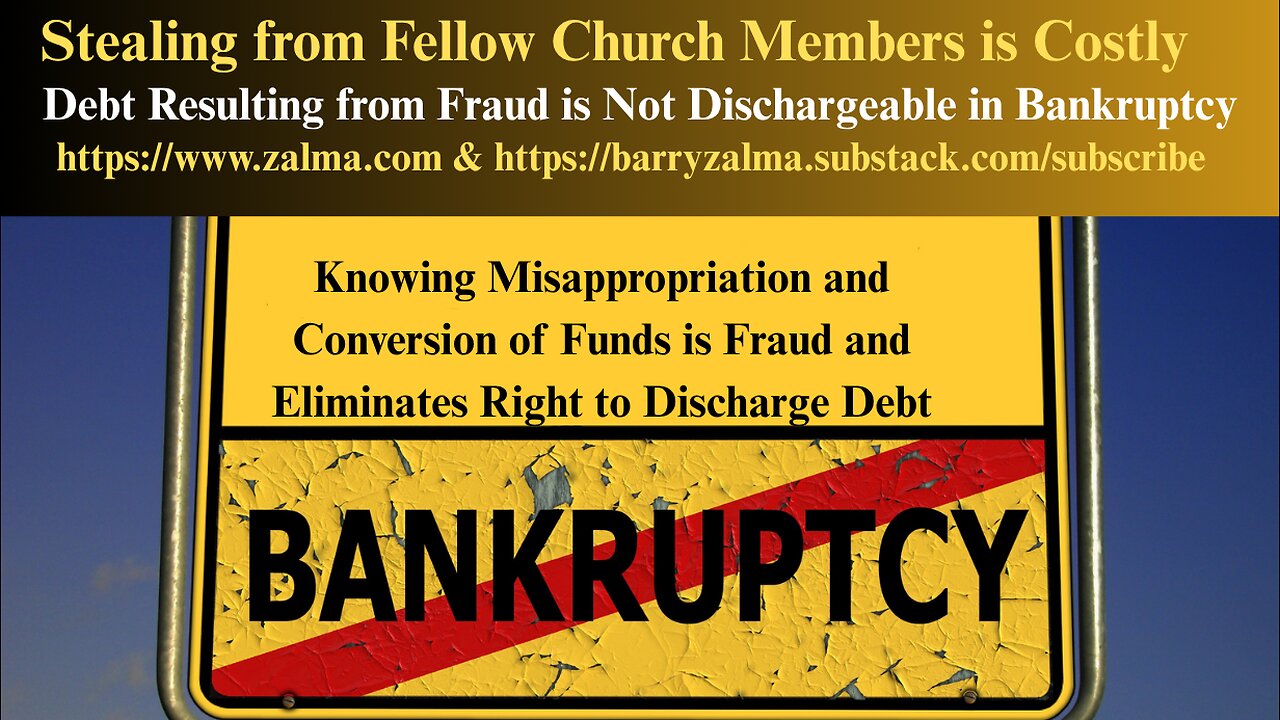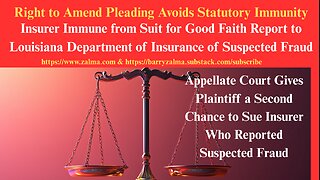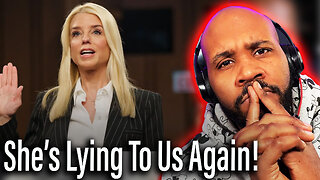Premium Only Content

Stealing from Fellow Church Members is Costly
Debt Resulting from Fraud is Not Dischargeable in Bankruptcy
Post 5230
Knowing Misappropriation and Conversion of Funds is Fraud
In re Matthew Jene Tubbs (Bankr. N.D. Tex., Fort Worth Div., No. 22-42728-MXM-7; Adv. No. 23-04019-mxm), October 15, 2025 .
Key Facts
Plaintiffs (Robles) and Defendant (Tubbs) met through their church; both held leadership roles. In Feb 2021 Robles home suffered major water damage from Winter Storm Uri and insurance paid $173,000.
In the Fall of 2021: Tubbs represented to Mr. Robles that he personally built a newer house and large barn on his parents’ property “with his own hands” (except foundation/insulation). That he had 10 years’ experience overseeing window/door installations at a major home-improvement chain, was a licensed contractor (false) and carried general contractor liability insurance.
Relying on these representations and Tubbs’s church handyman work, Robles hired Tubbs as general contractor for insurance repairs + upgrades, even though Tubbs had no prior general contracting experience.
The parties did not enter into a formal written contract. Instead, the parties jointly created a detailed budget Spreadsheet (labor + materials by room) and an 8–9 week timeline (later revised to end of Feb 2022).
Plaintiffs advanced $216,000 to Tubbs. Tubbs made almost no meaningful progress by August 2022 and was fired. Most items on the Spreadsheet never started. Flooring and kitchen cabinets he did start were defective and had to be redone. Tubbs failed to buy most materials despite having the funds and could not account for the money. Tubbs admitted on June 10, 2022: “I do not have the money to finish the project right now.” Tubbs admitted he used project funds for personal expenses (floor sander $5,000; personal credit-card bills $8,581).
Tubbs claimed he paid himself ~$78,000 as a legitimate GC/overhead fee ($10k/month). Court rejected this as not credible and unsupported by the Spreadsheet or timeline. Tubbs raised numerous defenses (undue influence by church authority, insurance fraud by plaintiffs, no binding contract, Tex. Prop. Code § 162.031(b) trust-fund defense, illegality, unclean hands, mistake, statute of frauds, etc.).
Legal Conclusions
§ 523(a)(2)(A) – False Pretenses / False Representation (nondischargeable)
Court found Tubbs made three material false representations that induced plaintiffs to hire him and advance funds:
He built the house and barn himself.
He was a licensed contractor.
He carried GC liability insurance.
The Court concluded that the Plaintiffs justifiably relied on these representations and rejected Tubbs’s “puffery” argument. The entire $152,610.05 debt was found to be nondischargeable on this ground alone (court did need to reach a finding of “actual fraud.)
§ 523(a)(6) – Willful and Malicious Injury (nondischargeable)
The statute requires deliberate/intentional injury (not just intentional act), or objective substantial certainty of harm + subjective motive, or intent to cause the actual injury.
Tubbs’s knowing misappropriation and conversion of at least $152,610.05 of project funds for personal use while knowingly leaving the job incomplete constituted willful and malicious injury to plaintiffs’ property.
Contract debts can be nondischargeable under § 523(a)(6) when the breach/conversion is intentional and harmful.
All of Tubbs’s Defenses Overruled
No undue church influence.
No insurance fraud or unclean hands by plaintiffs.
Valid oral contract existed (Spreadsheet + communications).
Tex. Prop. Code § 162.031(b) trust-fund defense inapplicable because the $78,000+ was not legitimately spent on the project or reasonable overhead/GC fee.
Conclusion
The bankruptcy court entered a nondischargeable judgment of $152,610.05 against debtor Matthew Tubbs in favor of the Robles, based on false representations that induced the contract and willful/malicious conversion of construction funds. Tubbs’s numerous defenses were rejected as not credible or legally unsupported.
Judgment for plaintiffs Felipe and Shereen Robles in the amount of $152,610.05, declared nondischargeable in Tubbs’s Chapter 7 bankruptcy under both 11 U.S.C. §§ 523(a)(2)(A) (false pretenses/representations) and 523(a)(6) (willful and malicious injury).
ZALMA OPINION
The availability of a great deal of insurance money creates a temptation to even honest church going people. Mr. Tubbs was tempted, lied about his abilities and took the insurance money designated to repair the home of Felipe and Shereen Robles and used it to pay off his ongoing debts and then filed bankruptcy hoping to avoid paying back what he owed. The bankruptcy court found that he defrauded the Robles' and could not discharge that debt.
(c) 2025 Barry Zalma & ClaimSchool, Inc.
Please tell your friends and colleagues about this blog and the videos and let them subscribe to the blog and the videos.
Subscribe to my substack at https://barryzalma.substack.com/subscribe
Go to X @bzalma; Go to Barry Zalma videos at Rumble.com at https://rumble.com/account/content?type=all; Go to Barry Zalma on YouTube- https://www.youtube.com/channel/UCysiZklEtxZsSF9DfC0Expg; Go to the InsuranceClaims Library – https://lnkd.in/gwEYk.
-
 8:24
8:24
Insurance Law
10 days agoRight to Amend Pleading Avoids Statutory Immunity
171 -
 13:46
13:46
Nikko Ortiz
11 hours agoYour Humor Might Be Broken...
9372 -
 2:20:13
2:20:13
Side Scrollers Podcast
16 hours agoVoice Actor VIRTUE SIGNAL at Award Show + Craig’s HORRIBLE Take + More | Side Scrollers
40.4K13 -
 18:49
18:49
GritsGG
12 hours agoI Was Given a Warzone Sniper Challenge! Here is What Happened!
37 -
 19:02
19:02
The Pascal Show
1 day agoNOT SURPRISED! Pam Bondi Is Lying To Us Again About Releasing The Epstein Files
3461 -
 6:05
6:05
Blabbering Collector
15 hours agoRowling On Set, Bill Nighy To Join Cast, HBO Head Comments On Season 2 Of Harry Potter HBO!
87 -
 57:44
57:44
TruthStream with Joe and Scott
2 days agoShe's of Love podcast & Joe:A co-Hosted interview, Mother and Daughter (300,000+Facebook page) Travel, Home School, Staying Grounded, Recreating oneself, SolarPunk #514
18.9K1 -
 30:49
30:49
MetatronHistory
1 day agoThe Truth about Women Warriors Based on Facts, Evidence and Sources
15.4K11 -
 2:59:08
2:59:08
FreshandFit
11 hours agoA Sugar Baby & A Feminist ALMOST Fight Each Other
211K46 -
 6:24:23
6:24:23
SpartakusLIVE
9 hours agoFriday Night HYPE w/ YOUR King of Content
100K1